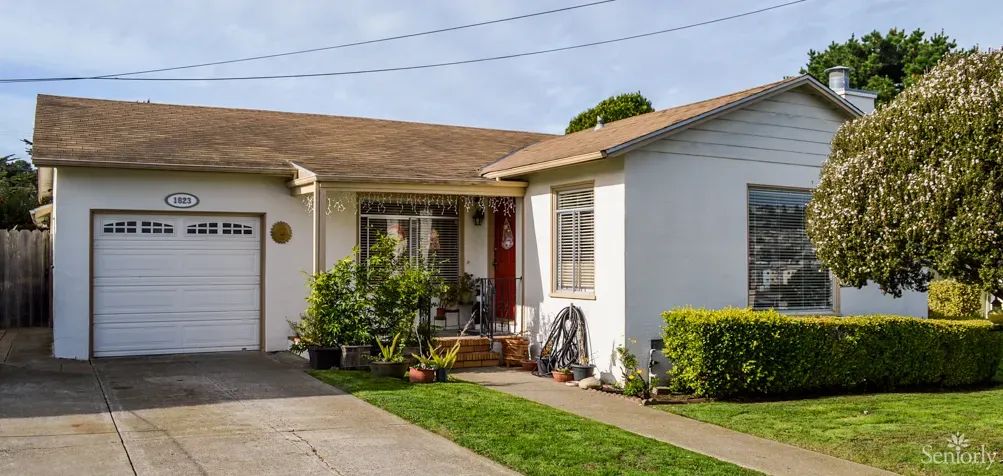Selling vs Renting Your Home
Trying to understand how to use your home as an asset to cover the cost of senior living. Seniorly breaks down the pros and cons of selling vs renting your home to fund senior living.

Selling vs. Renting Out Your Home When Moving to Assisted or Senior Living
Many seniors decide to move to either a smaller, more manageable home or into an assisted living community at some point in their lives. If the home they are currently in is owned in their name, a decision will be made in preparation for this move. Some might assume the best option is to sell the home, but renting out the house is another choice that can be considered. Either way, the decision can be difficult. Here's what you need to know when weighing your options.
Your Financial Situation is Unique
What works for one person won't work for everyone. Doing research and considering the options can help homeowners decide what is best for their situation. As they decide whether to sell or rent their home, answering these questions can help:
- How much is the home worth?
- What kind of real estate market is the area in right now?
- How much do management companies in the area cost?
- How much could the home bring in monthly as a rental?
- Is there time to take care of a rental property, and if not, who will take care of it?
- Is the home in a good condition to be rented to tenants?
Consulting with local real estate experts can help homeowners decide whether their home would make a good rental property.
Pros and Cons of Holding and Renting
Pros
Renting out a home is an excellent way to produce steady backup income in some cases. Homeowners hoping to mitigate their monthly costs can do so by renting their home. If the mortgage is largely paid off, the majority of the profit will go into the hands of the homeowner.
Homeowners who are worried about locking themselves into a long-term situation can always sell down the road, once they’ve had more time to consider the options and received advice from professionals. If your local housing market is appreciating, then waiting to sell may be a good option. If market prices are declining in your neighborhood, or currently in favor of buyers, waiting a few more years may significantly decrease the profit one receives from their sale.
Finally, renting out a home is an excellent way to keep a home in the family. Homeowners who want to keep their home for their children, or who just don't feel ready to give up their home yet, may find that renting is emotionally easier than selling.
Cons
Not all neighborhoods are appropriate for rental properties. This can be true in costly neighborhoods where the rent would be too high for most potential tenants. In addition, people who plan to rely on their rental home for income could find themselves in a bad position if their home doesn't continue to appreciate as it has in the recent past. This could also be a problem if the rental market starts to decline.
Finally, there's a learning curve to owning and running a rental home. People who have no experience with rental properties may find it stressful to learn some of the ins and outs of property management — even if they hire a property management company to do most of the legwork for them.
Pros and Cons of Selling
Pros
Some homeowners want to sell because doing so enables them to cash out right away. With a lump sum in their bank account, the homeowner is able to do what they see fit with their money. In fact, many people who plan to move into a smaller home instead of an assisted living facility might need to sell their old home in order to have money for the down payment.
The real estate market can change over time, and down turns can happen. Selling right away gives the homeowner peace of mind, knowing they sold their house in a good market. This reduces stress and enables the homeowner to focus on other things at an important time in their life.
Proceeds from a home sale can be used to fund other investments/passive income streams. If a person has more experience and comfort with using mutual funds for monthly income during retirement, they may decide to put some of their profits there and be done with it.
Cons
While many would consider this to be the safer/less risky route, homeowners who sell their home right away may miss the opportunity to let their home appreciate even more while collecting rental income.
Which Option Is Best?
Every homeowner is different. When trying to decide whether they should sell or rent their home, the homeowner must take into account their own budget, their ability to care for a rental property, and whether they'll want or need a source of regular income when they move into their new home.
If you're a homeowner who is thinking about renting or selling your property, one of the ways you can make a decision for yourself is to run the numbers and scenarios with loved ones and a financial advisor. Talking with local investors can help you weigh the pros and cons while also discussing the potential for your home to become a rental property. If your home might not make a good rental property, they might be able to estimate the potential value of the home, and where they might see the real estate market heading in the near future.
Talk to your financial planner and relatives as you decide what is best for your home. Make these decisions with help from loved ones, to ensure that everyone is on the same page when the decision is made.
Shawn Clayton is owner/broker at Clayton & Clayton Relators and has served the New Jersey areas for over 30 years. Real estate seems to be in Shawn's blood and goes back four generations! His firm, Clayton & Clayton, has been in business since 1930.
To learn more about Seniorly's editorial guidelines, click here.
Sign up for our Healthy Aging Handbook
Seniorly’s Senior Living experts created a comprehensive handbook to help people age happily while ensuring they love where they live. Enter your email address below to receive your copy and learn more about Healthy Aging and Senior Living.*
*By submitting your email address above, you consent to receive occasional email communications from Seniorly, including educational content and tips, newsletters, and other relevant updates and offerings. You can unsubscribe at any time and we will never sell or distribute your email address to a third party. You can view our Privacy Policy here.
